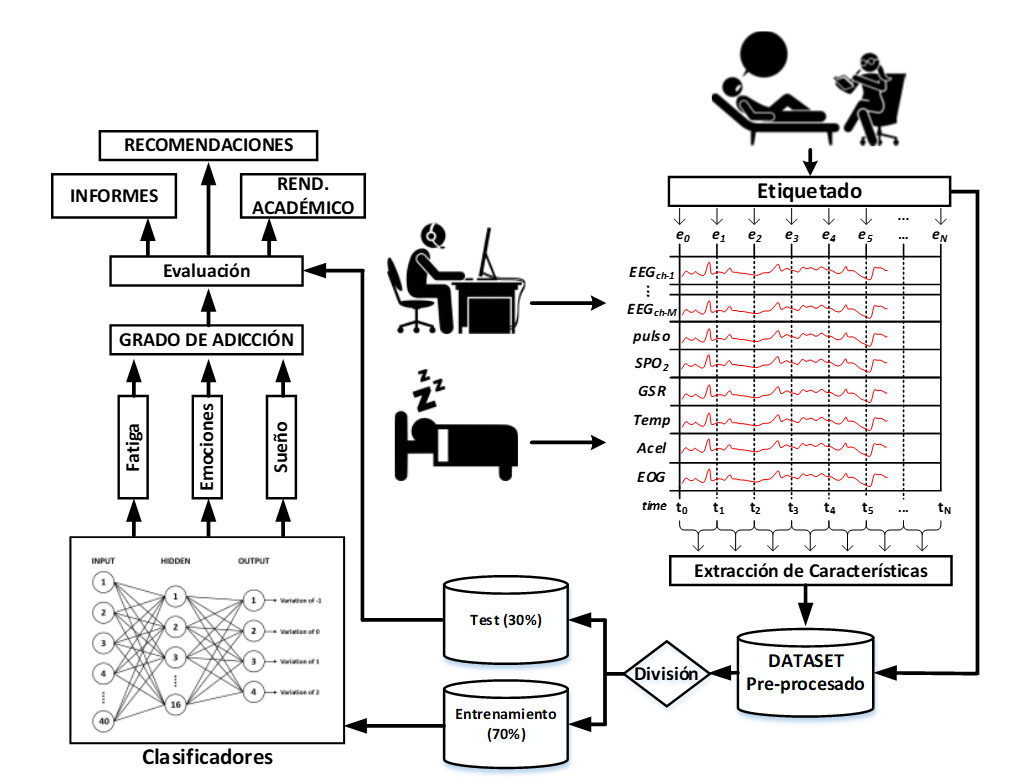ADDICTION to VIDEO games and its relationship with the emotional state, sleep and fatigue. Repercussions on academic performance, social relationships and mental health
The compulsive use of video games can end up causing interference and problems in all areas of personal life, generating a high level of conflict with our family, social and academic/work environment.
This research intends to evaluate the physiological, cognitive and emotional patterns present in the real practice of video games and their relationship with various indicators of the mental health of the participants. Thanks to this relationship, statistics will be obtained on the different levels of fatigue, emotional quality and sleep depending on the addiction of each participant, and the symptoms associated with this addiction will be empirically clarified. Likewise, it is intended to establish analogies between the physiological sensors that provide the most information to measure each of the variables proposed in this study. It is also expected to find a correspondence between the levels of addiction and the academic results, emotional well-being/discomfort and social behavior of the participants. In addition, we want to analyze if there is any difference in addiction levels according to age and gender.
This study is based on the collection of information on a large population, accustomed to the use of video games and, therefore, the university community is established as the target population. Various commercial devices will be used to record information in real time during users’ gaming sessions and a relationship will be established on their degree of addiction based on surveys guided by health professionals. With this data, various classifier systems would be developed, based on artificial intelligence technology, that can establish a relationship between the physiological aspects collected and the parameters to be studied: behavior, fatigue, sleep quality and VA. The results provided after evaluating these classifiers will determine the optimal system for the purpose of this study and will serve to develop a support system and generate reports that help the health professional in their task of diagnosing addiction. The results of this study would allow effective personalized solutions to be developed, so that through the use of applied Artificial Intelligence, professionals can reliably diagnose, propose personalized treatment and monitor people with video game addiction.
Current status:
(05/02/2024): The research protocol of an initial study has been approved by the research ethics committee of the University of Seville (CEIUS)
Inform yourself and participate
(25/09/2024): The research project entitled: “ADDICTION to VIDEO games and its relationship with the emotional state, sleep and fatigue. Repercussions on academic performance, social relationships and mental health”, with internal code (SICEIA) of protocol 2024-1858, has received a FAVORABLE OPINION by the research ethics committee of the University of Seville (CEIUS)
Inform yourself and participate
PI: Mª Lourdes Miró Amarante / Miguel Ángel Pertegal Vega
Type: Plan Estatal 2021-2023 Generación Conocimiento – Proyectos I+D+i
Reference: PID2022-141172OA-I00
Funding by: Ministerio de Ciencia e Innovación
Start date: 2023
End date: 2026
Researchers / Working group:
Antonio Abad Civit Balcells (Dpto. ATC)
Javier Civit Masot (Dpto. ATC)
Manuel J. Domínguez Morales (Dpto. ATC)
Emilio García Cabrera (Dpto. Medicina Preventiva y Salud Pública)
Francisco Luna Perejón (Dpto. ATC)
Luis Muñoz Saavedra (Dpto. ATC)
Manuel Rivas Pérez (Dpto. ATC)
José Luis Sevillano Ramos (Dpto. ATC)
Project PID2022-141172OA-I00 financed by MCIN/AEI /10.13039/501100011033/ and by FEDER “A way of making Europe”


